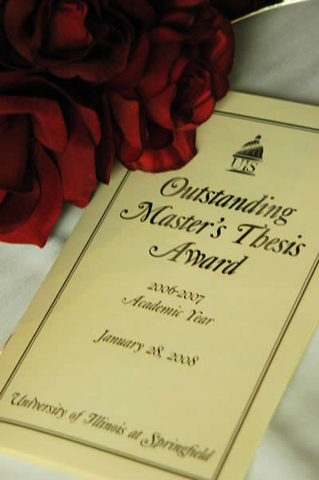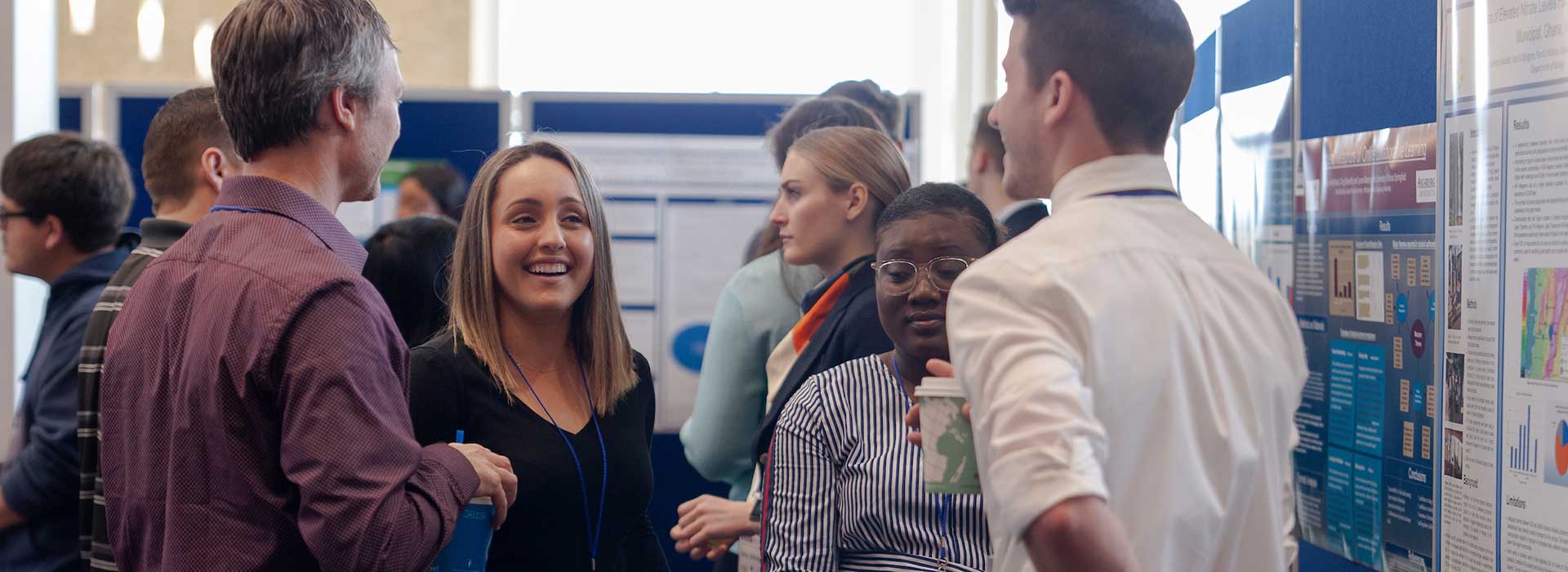
AY 2025-2026
UIS OUTSTANDING MASTER’S THESIS/PROJECT AWARD
Nomination Guidelines:
Each graduate faculty member at UIS can nominate one student for the Outstanding Thesis/Project award program. The faculty member's nomination must be accompanied by a letter explaining the reasons for the nomination. The letter should comment on the breadth of conceptualization, the depth of the analysis, the significance of the results, and/or the originality of the idea underlying the thesis/project. If the nominated work is a project, the letter should highlight the purpose and nature of the project, as well as its relevance to the student's course of study.
The Research Board may recommend that a master’s thesis be entered into the Distinguished Master’s Thesis Award program of the Midwestern Association of Graduate Schools if the winning work aligns with the annual category (Odd years: Disciplines of Social Sciences; and, Mathematics, Physical Sciences, and Engineering; Even years: Disciplines of Biological and Life Sciences; and, Humanities).
To be eligible for this year's award, the student must have graduated in Fall 2024, Spring 2025, or Summer 2025. An electronic form, a nomination letter, and an electronic copy of the nominated thesis or project must be submitted using the Thesis/Project Nomination Webform by 11:59 p.m. on Monday, September 29, 2025. Documents received after the deadline may not be accepted.
The UIS Research Board will select the outstanding thesis or project based on the criteria described below. The selected author and honorable mention awardees will be recognized at the 2026 Student Technology, Arts & Research Symposium (STARS), with an opportunity for the awardee to present their research.
Questions regarding this process should be directed to the Office of Research and Sponsored Programs at ora@uis.edu.
Nomination Material and Criteria
Nomination Guidelines
Faculty nominating a former student must complete a nomination WebForm and include:
- an electronic copy of the thesis or project including:
- a list of closure committee members on the manuscript’s title page and
- the nominated student’s current contact information
- a nomination letter which should:
- explain the reasons for the nomination,
- note whether the nominated piece is a thesis or a project,
- comment on issues such as the breadth of conceptualization, the depth of the analysis, the significance of the results, and/or the originality of the idea underlying the thesis/project, and
- be signed by the thesis chair.
- If the nominated work is a project, the letter should highlight the purpose and nature of the project, as well as its importance to the student’s course of study.
- a note from the student indicating that they accept their faculty mentor’s nomination and are willing to be considered for further award nominations. The Research Board may recommend a master’s thesis be entered into the Distinguished Master’s Thesis Award program of the Midwestern Association of Graduate Schools.
Evaluation Criteria
Clear Goals
- Does the scholar state the basic purposed of his or her work clearly?
- Does the scholar define objectives that are realistic and achievable?
- Does the scholar identify important questions in the field?
Adequate Preparation
- Does the scholar show an understanding of existing scholarship in the field?
- Does the scholar bring the necessary skills to his or her work?
- Does the scholar bring together the resources necessary to move the project forward?
Appropriate Methods
- Does the scholar use methods appropriate to the goals?
- Does the scholar apply effectively the methods selected?
- Does the scholar modify procedures in response to changing circumstances?
Significant Results
- Does the scholar achieve the goals?
- Does the scholars’ work add consequentially to the field?
- Does the scholar’s work open additional areas for further exploration?
Effective Presentation
- Does the scholar use a suitable style and effective organization to present his or her work?
- Does the scholar use appropriate forums for communicating work to its intended audiences?
- Does the scholar present his or her message with clarity and integrity?
Reflective Critique
- Does the scholar critically evaluate his or her own work?
- Does the scholar bring an appropriate breadth of evidence to his or her critique?
- Does the scholar use evaluation to improve the quality of future work?
Past Winners
2024-2025: Isaac Farhadian, Political Science
2022-2023: Connor Krater, History
2021-2022: Andrew Stokes, Environmental Studies
2020-2021: Angela Try, Communications
2019-2020: Nicholas Dabbs, English and Modern Language
2018-2019: Rashaun DeBord, History
2017-2018: Sarah Lindholm, Biology
2016-2017: J. Mark Redding, History
2015-2016: Amelia Owre, Environmental Studies
2014-2015: Hillary Rikli, Biology
2013-2014: Justin Ramey, Biology
2012-2013: Christopher Young, Environmental Studies
2011-2012: Sarah Collins, English
2010-2011: Stephanie Marie Ebersohl, English
2009-2010: Vera Leopold, Environmental Studies
2008-2009: Kelsi Megan Kerns, Communication
2007-2008: Heather Wikens, History
2006-2007: Denise Howard Long, English
2005-2006: Joshua Alan Doetsch, English
2004-2005: Patrick Pospisek, History
2003-2004: Tracy DiMezzo, Biology
2002-2003: Kristine Muschal, English
2001-2002: Laura E. Johnson, History
2000-2001: Madeline Gumble, History
